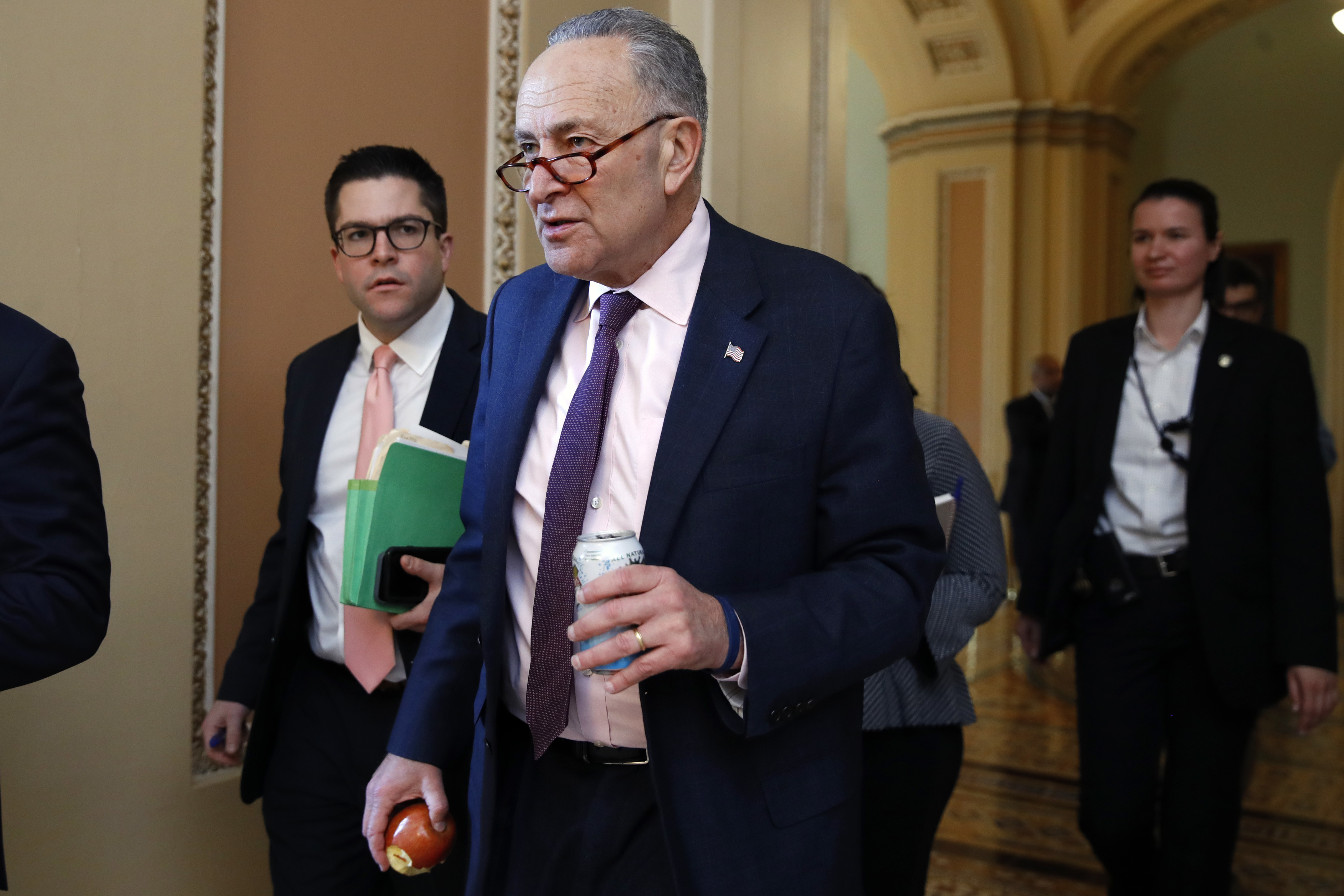
WASHINGTON (AP) — Republicans muscled the largest tax overhaul in 30 years through the Senate early Saturday, taking a big step toward giving President Donald Trump his first major legislative triumph after months of false starts and frustration on other fronts.
“Senate Republicans today came together to make history and advance a comprehensive tax overhaul that will deliver more income, more jobs, higher wages and more opportunity for all Americans,” Sen. Orrin Hatch, R-Utah, said in a statement Saturday. “Rooted in pro-growth policies, this legislation will help families and individuals invest in their future, promote savings and encourage American job creators to keep more jobs and investment here at home.”

“Just what the country needs to get growing again,” Senate Majority Leader Mitch McConnell, R-Ky., said in an interview after a final burst of negotiation closed in on a nearly $1.5 trillion package that impacts the breadth of American society.
He shrugged off polls finding scant public enthusiasm for the measure, saying the legislation would prove its worth. “Big bills are rarely popular,” he said. “You remember how unpopular ‘Obamacare’ was when it passed?”
Trump on Saturday tweeted his thanks to Senate and House Republicans as they now begin trying to reconcile differences in legislation passed by both chambers, a behind-closed-doors process that is expected to move swiftly. Trump is aiming to sign the tax package into law before Christmas. “Biggest Tax Bill and Tax Cuts in history just passed in the Senate,” he tweeted inaccurately. The overhaul is significant but far from the largest.
Presiding over the Senate, Vice President Mike Pence announced the 51-49 vote to applause from Republicans. Sen. Bob Corker, R-Tenn., was the only lawmaker to cross party lines, joining the Democrats in opposition. The measure focuses its tax reductions on businesses and higher-earning individuals, gives more modest breaks to others and offers the boldest rewrite of the nation’s tax system since 1986.
Republicans said the package would benefit people of all incomes and ignite the economy. Even an official projection of a $1 trillion, 10-year flood of deeper budget deficits couldn’t dissuade GOP senators from rallying behind the bill.
“Obviously I’m kind of a dinosaur on the fiscal issues,” said Corker, who battled to keep the bill from worsening the government’s accumulated $20 trillion in IOUs.
The Republican-led House approved a similar bill last month in what has been a stunningly quick trip through Congress for complex legislation. Democrats derided the hastily written, scribbles-in-the-margin crafting of the bill in the final hours Friday night.
After spending the year’s first nine months futilely trying to repeal President Barack Obama’s health care law, GOP leaders were determined to move the measure rapidly before opposition Democrats and lobbying groups could blow it up. The party views passage as crucial to retaining its House and Senate majorities in next year’s elections.
Democrats dismissed the bill as a gift to its wealthy and business backers at the expense of lower-earning people. They played up the fact that the bill would permanently reduce corporate tax rates, from 35 percent to 20 percent, while offering only temporary tax cuts to individuals, lasting until 2026.
Congress’ nonpartisan Joint Committee on Taxation has said the bill’s reductions for many families would be modest and by 2027, families earning under $75,000 would on average face higher, not lower, taxes.
“We did lay the groundwork for future pro-family tax reform and I am confident we will get there someday,” Sen. Mike Lee, R-Utah, said in a statement Saturday, while celebrating the bill’s doubling of the child tax credit to $2,000.

The bill is “removed from the reality of what the American people need,” said Senate Minority Leader Chuck Schumer, D-N.Y. He criticized Republicans for releasing a revised, 479-page bill that no one could absorb shortly before the final vote, saying, “The Senate is descending to a new low of chicanery.”
“You really don’t read this kind of legislation,” Sen. Ron Johnson, R-Wis., told home-state reporters, saying senators focus on the major provisions as opposed to the “mind numbing” comparisons to current law.
Democrats took to the Senate floor and social media to mock one page that included changes scrawled in barely legible handwriting. Later, they won enough GOP support to kill a provision by Sen. Pat Toomey, R-Pa., that would have bestowed a tax break on conservative Hillsdale College in Michigan.
The bill hit rough waters after the Joint Taxation panel concluded it would worsen federal shortfalls by $1 trillion over a decade, even when factoring in economic growth that lower taxes would stimulate. Trump administration officials and many Republicans have insisted the bill would pay for itself by stimulating the economy. But the sour projections stiffened resistance from some deficit-averse Republicans.
After bargaining that stretched into Friday, GOP leaders nailed down the support they needed in a chamber they control, 52-48. Facing unyielding Democratic opposition, Republicans could lose no more than two GOP senators and prevail with a tie-breaking vote from Vice President Mike Pence but ended up not needing it.
Late changes introduced by GOP leaders included helping millions of companies whose owners pay individual, not corporate, taxes on their profits by allowing deductions of 23 percent, up from 17.4 percent. That helped win over Wisconsin’s Johnson and Steve Daines of Montana.
People would be allowed to deduct up to $10,000 in property taxes, a demand of Sen. Susan Collins of Maine. That matched a House provision to keep some GOP votes from high-tax states like New York, New Jersey and California.
The changes added nearly $300 billion to the tax bill’s costs. To pay for that, leaders decided not to erase the alternative minimum tax. Instead, they reduced the number of high-earners who must pay it. They also increased a one-time tax on profits U.S.-based corporations are holding overseas and they would require firms to keep paying the business version of the alternative minimum tax.

Sen. Jeff Flake, R-Ariz. — who like Corker had been a holdout and has sharply attacked Trump’s capabilities as president — voted for the bill. He said he’d received commitments from party leaders and the administration “to work with me” to restore protections, dismantled by Trump, for young immigrants who arrived in the U.S. illegally as children. That seemed short of a pledge to actually revive the safeguards.
The Senate bill would drop the highest personal income tax rate from 39.6 percent to 38.5 percent. The estate tax levied on a few thousand of the nation’s largest inheritances would be narrowed to affect even fewer.
Deductions for state and local income taxes, moving expenses and other items would vanish, the standard deduction — used by most Americans — would nearly double to $12,000 for individuals and $24,000 for couples, and the per-child tax credit would grow.
The bill would abolish the “Obamacare” requirement that most people buy health coverage or face tax penalties. Industry experts say that would weaken the law by easing pressure on healthier people to buy coverage, and the nonpartisan Congressional Budget Office has said the move would push premiums higher and leave 13 million additional people uninsured.
Hatch said the individual mandate repeal is a step toward “improving our nation’s flawed and unworkable healthcare system.”
“By effectively repealing the regressive Obamacare individual mandate tax,” Hatch said, “we are putting Americans in charge of their health care and giving them the freedom to choose the best coverage for themselves and their families.”
Drilling would be allowed in the Arctic National Wildlife Refuge. Another provision, knocked out because it violated Senate budget rules, would have explicitly let parents buy tax-advantaged 529 college savings accounts for fetuses, a step they can already take but which anti-abortion forces wanted inscribed into law. There were also breaks for the wine, beer and spirits industries, Alaska Natives and aircraft management firms.
Written by ALAN FRAM, MARCY GORDON and STEPHEN OHLEMACHER of the Associated Press with contributions from AP writers Andrew Taylor and Richard Lardner in Washington and Scott Bauer in Milwaukee.
St. George News Reporter Joseph Witham also contributed to this report.
Email: [email protected]
Twitter: @STGnews
Copyright 2017 The Associated Press. All rights reserved. This material may not be published, broadcast, rewritten or redistributed.
This article was written by Associated Press…..
I see no reason to accept the honesty and truthfulness of this article.
That really sums up your level of intelligence, or lack thereof.
Got your swamp life preserver on?
How about having just VAT only now that would be tax reform. Of course you would need to see spending slashed to keep the rate down as much as is possible. No more winners and losers just pay the tax for things you buy.
Thanks for leading off with the photo of the poster that summarizes the windfall for the wealthiest taxpayers. Deficit spending is the new way of life, postponing the pain for future generations. Can’t imagine the Dems fixing this mess in 2019.
Thank you President Trump!!! Make America great gain!!!